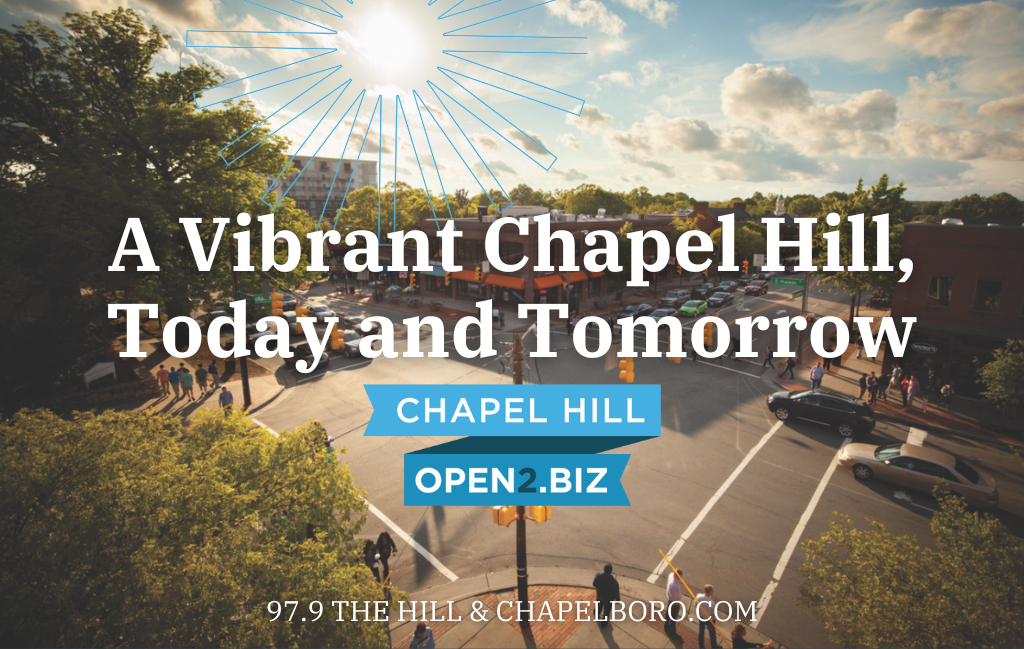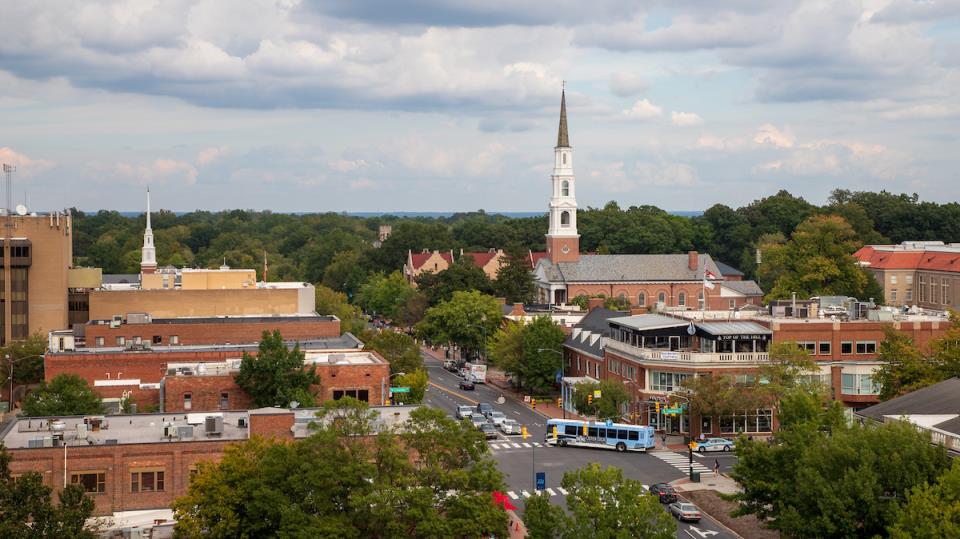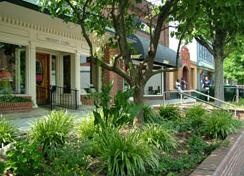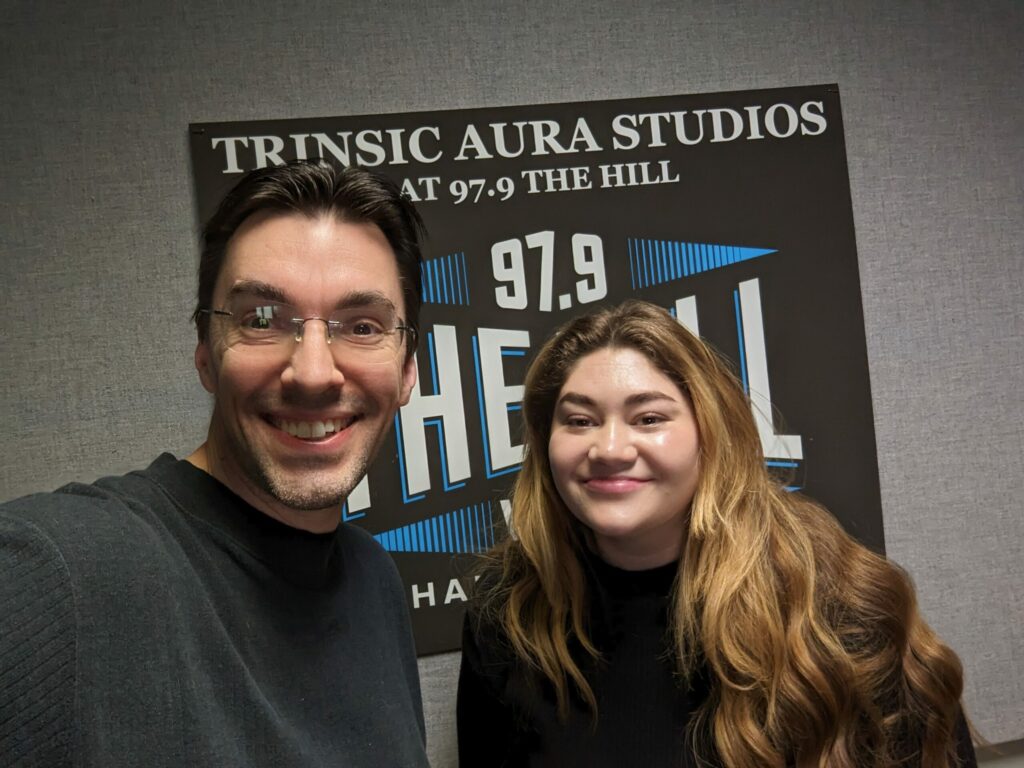
Welcome to “A Vibrant Chapel Hill, Today and Tomorrow!” a monthly interview series with Chapel Hill’s Economic Development and Parking Services office, exclusively on 97.9 The Hill WCHL & Chapelboro.com.
Every month you’ll get updates from department staff and special guests, to learn about initiatives the town is taking to ensure a Vibrant Chapel Hill, Today and Tomorrow.
This month’s guest: Sarah Potter, Economic Development Program Coordinator with Town of Chapel Hill’s Economic Development.
Listen to the full conversation with Aaron Keck or read the transcript below, which is lightly edited for clarity.
Aaron Keck: Sarah, How are you?
Sarah Potter: Good morning. I’m doing well. The weather’s been really great.
I’m planning a trip to Seattle to visit some local government folks in a few weeks. I’m not looking forward to the cold there.
Keck: At least it’s a relatively tempered cold during the wintertime. Are you visiting folks ?
Potter: I’m going out there with my grad school friends from my MPA class. All of them are local government professionals around the country and we all try to meet up every six months or so. Which is kind of fun.
Keck: Awesome, That sounds like a personal fun trip, not a business trip?
Potter: Yes, but we do end up talking business.
Keck: I’ve met up with grad school friends before. It’s just shop talk the whole time. What’s going on in town? You’ve got the Streetscape study that’s going on.
Potter: That’s the biggest project that our office just kicked off, a few months in the making and a little delayed because of the holidays. This is phase two of a big project that came out of some of the other downtown revitalization efforts. The main focus is creating a vision and design for downtown streets and our public right of ways that achieves economic vitality. We are focusing on improving the pedestrian experience downtown and also making our streets more safe, more accessible, and hopefully creating a downtown where people come and stay there and patronize our businesses and achieve economic vitality. It’s a big project.
Keck: When you say Streetscape, what does that actually mean?
Potter: It’s essentially all of the public right of ways, building to building. It includes sidewalks, the streets, furniture, street lighting, things like that. We have a special focus with this project for gathering spaces like Peace and Justice Plaza. We want to recognize that a lot of different people come downtown for different reasons. And part of this project is also figuring out how to make the streets work for everyone. Whether you’re riding a bike, whether you’re riding transit, or driving a personal vehicle or walking around, we want you to feel safe and comfortable in those are public right of ways.
Keck: Are we focusing on Franklin Street?
Potter: It’s all streets, but mostly focusing on Rosemary, Franklin and Cameron, and this step of the project also includes all the side streets. One of the biggest issues facing downtown traffic is the loading zones, so we’re taking that into consideration and thinking of some opportunities to make those side streets a little bit more accessible for things like that.
Keck: Especially now that that there is an idea behind Rosemary Street, like it’s a destination too.
Potter: We’re hoping that this vision really creates an activation of that street. We’re going to have a lot of downtown workers and people walking around. We want to make sure that every piece is coming together as the development projects come online.

(Image via townofchapelhill.org)
Keck: Are there specific questions that you’re trying to have answered here?
Potter: Our first phase focused a lot on who’s coming to downtown, why are they coming, and also who isn’t and why aren’t they? And accepting how we can make streets a little bit more flexible. Some things we’ve talked about are areas of flat curbs, those areas can then become street festival spaces. (Town of Chapel Hill) Community Arts and Culture can have a lot of great events and we can make those things even greater if we have streets that can be used in that purpose. This phase of the study is more about material selection, things like that. We’ll go into details about accessibility. Making sure people who have mobility issues or are visually impaired can get around safely. Sometimes that comes down to materials.
Keck: Is it harder or is it the perfect time or both, to do a Streetscape study on Rosemary Street with all of that construction going on and the future of it not being in place yet?
Potter: That’s an interesting question. I think it’s the perfect time because I think it’s also a signal to all those coming businesses and coming people. For example, the office where we work in currently is going to be the Link apartments. And so this is signaled to people who might be moving there to work downtown that we are taking in account what their experience is going to be like. This is a long project, the results and the designs of this probably won’t come into fruition for five, ten, even more years. You have to do a lot of planning before you get to implementation.
Keck: And you have to do it way in advance, right?
Potter: Yes. And there’s a lot of stakeholders involved, we wanted to make sure we’re getting engagement and feedback from everyone. It’s (Chapel Hill) Transit, GoTriangle, a lot of people use our streets, and we want to make sure we do our best to get everyone’s involvement and feedback.
Keck: How can residents weigh in? Or people who work and play downtown?
 Potter: There’s going be two big opportunities for in-person engagement. We’ll have our first session April 9th to the 11th, and that’s called The Great Streets Workshop. And we’ve been working with a consultant who specializes in this kind of street design. They are in an office space out of Raleigh, and a lot of their team are graduates from Chapel Hill. They’re super familiar with the area. They bring in people who have gone through the implementation phase. I think this can be a really scary thing, because is it construction again? And so they bring in people who’ve experienced this to talk about how beneficial it’s been to their community and what it was like to live through that stage of this project. And also to talk about the opportunities that are here. We have a lot of other really great things going on in town, the Everywhere to Everywhere Greenway Plan that will all play in a role in making these streets great.
Potter: There’s going be two big opportunities for in-person engagement. We’ll have our first session April 9th to the 11th, and that’s called The Great Streets Workshop. And we’ve been working with a consultant who specializes in this kind of street design. They are in an office space out of Raleigh, and a lot of their team are graduates from Chapel Hill. They’re super familiar with the area. They bring in people who have gone through the implementation phase. I think this can be a really scary thing, because is it construction again? And so they bring in people who’ve experienced this to talk about how beneficial it’s been to their community and what it was like to live through that stage of this project. And also to talk about the opportunities that are here. We have a lot of other really great things going on in town, the Everywhere to Everywhere Greenway Plan that will all play in a role in making these streets great.
Keck: If people want to know more about those upcoming events, head to the website, it’s all there?
Potter: Yes. We’ll be advertising it. We are still solidifying all of our dates and times, but we’ll put those out on social media on all the town channels, and we’ll come back (to 97.9 The Hill WCHL) next month and talk about a little bit more about it too.
Keck: ChapelHillEconomicDevelopment.org is the website. Go there and find out more about the street scape study as it’s going on right now, and get more information later about how you can weigh in. What else is going on that folks should know?
Potter: We’re having our first CCES meeting, which is the Council Committee on Economic Sustainability. This is our first meeting with our newly elected mayor and our three new council members. We’re going to take a deep dive into what we’ve been doing in the economic development realm for the past two years, revisiting those goals and talking about the future. So we have a really great opportunity, now that we’re still in the post pandemic recovery, to look forward. We want take into account that things have changed a lot since we’ve first talked about those goals. There will be great conversations surrounding complete communities and business support.
Keck: Are you expecting to hit them with information they don’t know?
Potter: Some of it is going to be a reorientation and introduction. One of the biggest things we’ve been working off is our Revive plan, which is a data focused plan coming out of the pandemic. The whole plan was built to create a resilient economy, and that’s still relevant, We always want to be a diverse and resilient economy, that way we can feel less of the impact of the things we can’t control.
Keck: Pandemics are rare, but recessions are not.
Potter: That’s correct. Setting ourselves up in the best way possible to mitigate those effects, so a lot of that stuff is still relevant and we’re still working on things. It should be really great conversation.
Keck: Awesome. Anything else going on that folks should know about?
Potter: There are some big events coming up from our community partners. UNC is holding their engagement week, February 26th through March 1st. And they’re bringing in a lot of different community partners and resources. It’s a great way for people to go and see what options are there available. Everything from small business support to personal and non-profit support. They’re having a public reception on March 1st.
Keck: Sarah Potter, thank you so much for being with us.
Potter: Thank you. Have a nice day.

Aaron Keck and Sarah Potter

